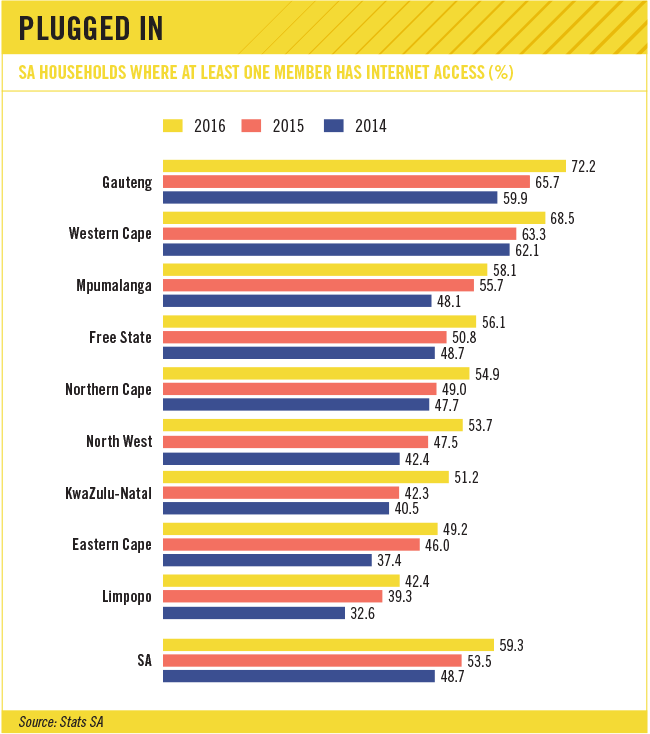It used to be a feature of Saturday morning in SA – every time you’d buy a newspaper, you’d end up with a fat wad of pages – bigger than the news, bigger even than sports, usually three sections thick – making up the property section. Whether you were actively in the market for a new home, or just painting your existing place and looking for a thick layer of paper for a drip mat, you knew all about that property section.
Lance Chalwin-Milton, joint MD of High Street Auctions, smiles at the memory. Today, of course, Saturday mornings are more likely spent browsing Facebook or checking Instagram. ‘We’ve actually stopped advertising in newspapers,’ says Chalwin-Milton. ‘We weren’t getting the reach we were expecting to get from that spend. Since then, our website has gained enormous traction, and about 90% of our property advertising is now done online.’
The High Street Auctions story is typical. More and more SA businesses are moving online, embracing the commercial possibilities of digitalisation. As Chalwin-Milton puts it, ‘the internet is huge, and it’s an enormous tool for us’.
However, you read (or, to the point, no longer read) the papers, so you knew that already. What you may not have known is the full extent of that digitalisation explosion. Statistics South Africa’s General Household Survey report, released in June 2016, shows that 59.3% SA households had at least one member with access to the internet either at home, work, place of study or internet cafés. That’s more than half of SA’s households – and a significant increase on the 2014 figure of 48.7%.
‘The latest internet penetration data from Stats SA aligns with our own understanding of the situation,’ George Kalebaila, the Industrial Development Corporation’s senior research manager for telecoms and media in Africa, told ITWeb. ‘The main driver of this trend is the growing penetration of smartphones, which stands at just over 40%, which is the primary means for internet access. If we exclude mobile, internet penetration from fixed broadband is just about 5.3%. This shows the importance of mobile in driving access to the internet, not only in South Africa but in also Africa.’
Added to that is the current boom in fibre to the home (FTTH) that’s happening across the country and continent. According to a new report released by Research and Markets, this ‘increasingly loud FTTH revolution … is made even more notable by the unique nature of some of its characteristics. Between 2014 and 2016, the number of homes and premises passed by fibre has more than tripled. The cumulative number of African homes/premises passed by fibre crossed the 1 million mark in 2016. We expect it to hit the 2 million mark in 2017’. (Incidentally, the report notes that just five markets – Kenya, Mauritius, Morocco, Nigeria and SA – account for 85% of Africa’s FTTH deployment.)
WiFi, too, is growing. Although SA currently has just one WiFi hotspot for every 6 500 people, Riaan Graham, director of sales in sub-Saharan Africa for US-based Ruckus Wireless, expects the local WiFi market to skyrocket, growing by around 30% annually. ‘This will be driven largely by the retail sector, but as the roll-out of fibre infrastructure to the suburb gains momentum, WiFi penetration will explode,’ he told ITWeb.
‘When you think back to where we were a few years ago, the growth of WiFi penetration in South Africa has been phenomenal. So has the improve-ment of the whole WiFi hotspot experience.’
Graham notes that when Ruckus Wireless first entered the SA market five years ago, WiFi access points could deliver speeds of just 54 megabits per second. Today, you can expect speeds of around 1.7 gigabits per second.
‘In the business context, the philosophy of digitalisation refers to the process of moving to a business that makes effective use of digital channels,’ says Yaron Assabi, CEO of marketing agency Digital Solutions Group (DSG). This goes beyond the digitisation of only information or operations, and includes the adoption of key tech trends that will underpin the business’ strategy and operations. ‘This adoption needs to be strategic, as the overarching aim is to transform the business through the use of the internet and digital technology – to change the business model and provide new revenue and value-producing opportunities,’ says Assabi. ‘Today’s digital and technological disruptions continue to affect the relevance and competitiveness of businesses across markets and industries.
‘Within this context, digitalisation is not only about impro-ving what businesses do with technology – to streamline processes, make the business more effi-cient and cost effective – but fundamentally changing businesses through the adoption and use of technology.’ Digitalisation has certainly fundamentally changed the financial sector, where disruptive technology is tearing down the barriers to access to premium investment opportunities. A business like Wealth Migrate, for example, now offers a minimum investment from just R1 000 for SA real estate investments. Opportunities such as these were previously only accessible to institutions and high net-worth individuals, but the company’s technology now offers real estate investment opportunities to individuals who would previously not have had access to them, according to its chief information officer, Jaco Maritz.
With that increased access comes a need for tighter security … as every online business has discovered. Online retail in SA – while still accounting for just 1% of retail revenue – has recorded growth rates of more than 20% year-on-year since 2000, according to recent numbers from World Wide Worx. ‘But while this is great news for the economy, there remain many obstacles for the general business community when it comes to taking the leap in creating a virtual channel to market,’ says Kyle Rozendo, chief tech-no—logy officer at e-commerce service SID Instant EFT.
‘First of all, setting up an e-commerce offering is more complex than one thinks,’ he says. ‘Most businesses focus on choosing the preferred platform, design and even delivery method. Payment options are often the last thing business owners consider and, unfortunately, this is where the real challenges can creep in.’
Most digital platforms offer e-commerce plug-ins that accommodate card payments or global options like PayPal. However, according to Rozendo, ‘South Africa’s broader payment landscape is not nearly as sophisticated as we assume. As we know, only 1% of retail spend is channelled online – and while some seasoned online shoppers may be perfectly happy with online security, there is still many a wary first-time shopper who may feel daunted by having to set up a PayPal account or nervous about sharing credit card details. To add to the card challenge, just one-fifth of South Africa’s banked population has a credit card, which further narrows a merchant’s pool of potential customers.’
For investment firms like Wealth Migrate – and for property sellers like High Street Auctions – security is of paramount importance. ‘We make use of private storage for uploading and downloading client documents as part of the FICA process, which can only be accessed by selected personnel. This is done via Shared Access Signature tokens to provide industry-standard protocols to access these data stores,’ says Maritz.
Wealth Migrate has also integrated blockchain technology in order to offer enhanced security and privacy protections. Blockchain is secure by design, eliminating the need for third-party intermediaries through a distributed ledger or decentralised data-base. ‘The inclusion of blockchain provides our investors with a number of benefits, including greater protection of personal information, enhanced compliance, the inclusion of smart contracts, and decentralised confirmation of transactions,’ he says.
‘We have gone out of our way to create one of the most secure and compliant online global real estate investing marketplace, while achieving our ongoing mission of making it simple, safe, and easy for investors at every level.
‘In addition to the integration of blockchain, we have added an additional level of security within our blockchain as a “one-way hash code”,’ adds Maritz. ‘This highly secure encryption is applied to investment transactions and offers an unprece-dented level of privacy and cybersecurity protection in cross-border transactions.’
From a security point of view, technology such as blockchain is a game changer. But then, so were online listings. So was WiFi. So is fibre. What’s next? Who knows. But with every innovation and improvement that digitalisation allows, SA’s businesses move another step away from old-school inefficiencies and towards those fundamental changes that are now, increasingly, becoming possible.











